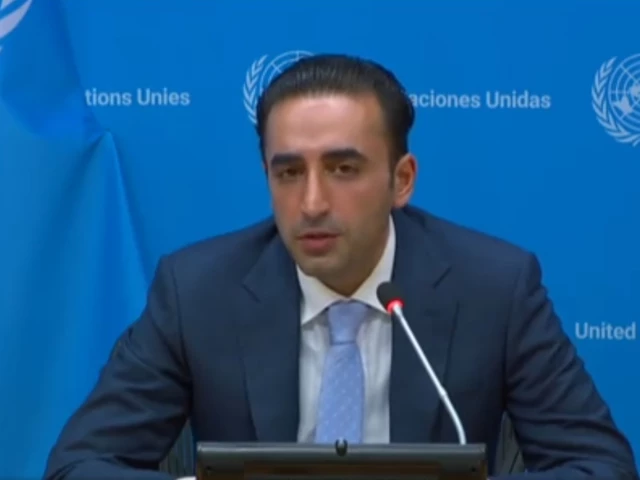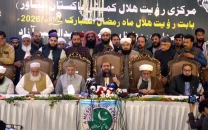Bilawal proposes ISI-RAW tie-up to fight terror
Terms ceasefire a welcome first step

Former foreign minister Bilawal Bhutto Zardari said on Tuesday that "if" the premier spy agencies of both Pakistan and India "sit together" and collaborate with each other there could be a significant decline in terrorist activities in the region.
Bilawal, who is leading a multi-party delegation to world capitals to present Pakistan's stance on the recent escalation with India, told a press conference in New York that the ceasefire between the two countries was a "welcome first step", yet it was merely a first step.
Bilawal's press conference came just before his departure for Washington for the delegation's meeting with top US leaders and lawmakers. At the UN, he held several meetings with ambassadors from the Security Council (UNSC) members, including the US, France, and the current president of Guyana.
Bilawal suggested instead of accusations, counteraccusations and finger-pointing over terrorism, the effective way would be for Pakistan and India to work together to combat this menace.
"I am completely confident that if ISI [Inter-Service Intelligence of Pakistan] and RAW [Research and Analysis Wing of India] sat down and worked together to fight these forces, we would see a significant decrease in terrorism both within India and Pakistan," he said.
He pointed out that Pakistan was the biggest victim of terrorism and suffered far more terrorist attacks than India. "If you compare the number of victims to terrorism then far more Pakistanis are killed by terrorists than Indians," he told the media.
Bilawal condemned India's illegal strikes inside Pakistan on May 7, calling them a violation of the UN Charter and international law. He said the attacks targeted civilian infrastructure, places of worship, dams, and water and energy facilities, causing civilian casualties, including women and children.
He also rejected India's "new normal" doctrine as "new abnormal" that it was trying to impose on the region. "We can't leave the fate of 1.5 or 1.7 billion people in the hands of non-state actors and terrorists, allowing them to decide on a whim that two nuclear-armed powers should go to war."
He blamed India for using the April 22 Pahalgam attack in Indian Illegally Occupied Jammu and Kashmir (IIOJK) as a pretext for aggression. He said that India rejected Pakistan's offer for investigation and instead launched strikes against Pakistan.
In response, he added, Pakistan acted in self-defence and downed six Indian planes that had attacked its territory. Pakistan has consistently condemned terrorism in all its forms," he said. "Pakistan would still like to cooperate with India to combat terrorism."
Bilawal credited the international communityparticularly US President Donald Trump and Secretary of State Marco Rubio – for facilitating a ceasefire between the two countries. However, he warned that while the ceasefire is a welcome first step, the risk of full-scale conflict remained dangerously high.
Urging the global community to continue pushing for dialogue and diplomacy as the only viable path to lasting peace, Bilawal cautioned that "the threshold for war [between Pakistan and India] has lowered, not risen" because of India's so-called new normal.
"In addition to this, there is a root cause [which] in this case is the unresolved agenda of Kashmir before the UN Security Council," he said. "If we continue to ignore this issue and allow that wound to fester, there will forever be a bone of contention between India and Pakistan."
He stressed the need for a mechanism where Pakistan and India could bring any complaints to a mutually agreed forum and work together to identify, track and deliver justice to terrorists. He also said that the threat to cut Pakistan's water would be seen as an act of war by Pakistan.
Pakistan had sent two delegations to different world capitals as part of Islamabad's diplomatic offensive against India to apprise the world of Pakistan's stance vis-à-vis India's aggression following the Pahalgam attack.
Bilawal is leading a nine-member delegation to the US while another team, led by Special Assistant to Prime Minister (SAPM) Tariq Fatemi is currently touring Moscow and held a meeting with Russian Foreign Minister Sergey Lavrov on Tuesday.
At the UN, the Pakistani delegation reached out to the representatives of the UNSC members, including some of the close allies of India, and briefed them on the alarming security developments in South Asia, following India's recent military aggression and unilateral actions.
The meetings on Tuesday included the permanent representatives to the UN from the US, Guyana [the UNSC president for the month of June], France and officials from the Organisation of Islamic Cooperation (OIC).
France is one of the closest allies of India and the meeting of the Pakistani delegation with the French Ambassador to the United Nations was significant keeping in view that the Pakistani Air Force (PAF) shot down French-made Rafale jets on the night of May 6 and 7.
An official handout said that Ambassador Jerome Bonnafont met with the Pakistani parliamentary delegation. Bilawal apprised the French envoy of the grave consequences arising from India's baseless attribution of the Pahalgam attack to Pakistan without any credible investigation or evidence.
The delegation briefed the French ambassador regarding the alarming security developments in South Asia, following India's recent military aggression and unilateral actions in violation of the international law that threatened the fragile strategic balance in the region.
Bilawal condemned India's unilateral military strikes against civilians, leading to deaths and injuries and damage to civilian infrastructure in Pakistan, the arbitrary holding in abeyance of the IWT, and India's persistent belligerence.
He warned against India's attempt to impose the so-called "new normal" of arbitrary strikes, saying that such conduct would have serious implications for a nuclearised region like South Asia. He said that Pakistan was committed to eliminating terrorism, including the one funded and supported from India.
He underscored the imperative of a peaceful resolution of the Kashmir dispute in accordance with relevant UNSC resolutions for durable peace and stability in South Asia. He urged France to play a role in ensuring a sustained ceasefire, revival of the IWT, and initiation of a comprehensive Pak-India dialogue.
The French ambassador expressed his country's support for regional peace and stability and the need for bilateral dialogue between India and Pakistan. He reiterated the importance of restraint, dialogue, and adherence to international obligations.
Members of the parliamentary delegationHina Rabbani Khar, Sherry Rehman, Dr Musadik Malik, Khurram Dastgir Khan, Jalil Abbas Jilani, Tehmina Janjua, Bushra Anjum Butt and Syed Faisal Subzwari – were also present on the occasion.
The Pakistani delegation was scheduled to arrive in Washington later in the day, where it planned to engage with Secretary of State Marco Rubio, other senior officials, lawmakers, and think tanks till June 6. The team will also visit London and Brussels later.
Meanwhile, at the beginning of his visit to the Russian Federation, SAPM Fatemi, called on Russian Foreign Minister Lavrov in Moscow and conveyed Prime Minister Shehbaz Sharif's message for President Vladmir Putin.
During the meeting, Fatemi reiterated Pakistani leadership's commitment to deepening bilateral cooperation with Russia across various sectors, including energy, connectivity, and trade. He also provided a detailed briefing on recent developments in South Asia.
The SAPM outlined Pakistan's concerns regarding regional escalation risks. In particular, he highlighted the serious implications of India's threat to disrupt the IWT by declaring it in so-called "abeyance."
Lavrov expressed satisfaction with the steady growth in bilateral cooperation, underscoring key collaborative projects such as the establishment of new Steel Mills and critical connectivity initiatives.
He reaffirmed Russia's eagerness to strengthen ties with Pakistan within the framework of the Shanghai Cooperation Organization (SCO), particularly in the area of counter-terrorism.
Regarding Pakistan-India relations, Foreign Minister Lavrov emphasised Russia's support for the normalisation of ties between the two countries, noting its positive impact on regional stability.
(With additional input from news desk)





















COMMENTS
Comments are moderated and generally will be posted if they are on-topic and not abusive.
For more information, please see our Comments FAQ